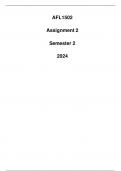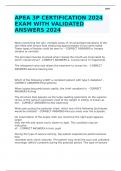Exam (elaborations)
AFL1502 Assignment 2 (Detailed Answers) Semester 2 2024
- Institution
- University Of South Africa
QUESTION 1 (a) Give a brief explanation of the term ‘conflict’ as found in a modern novel or drama. (10) (b) The structure of an essay may be divided into 3 parts. Identify these 3 parts and then give a brief discussion of each part. (9) (c) Read the following poem and answer the question...
[Show more]




